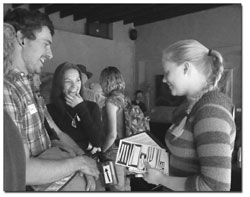|
| ||||
| Trading for sustainability
by Missy Votel It’s been said that time is money, but a new local endeavor is taking that phrase one step further. The recently formed La Plata Skills Trade Collective is seeking to galvanize the local economy while strengthening community ties using a currency as old as time itself. The idea for a skills trade collective, whereby people trade their skills and services in a money-free transaction, came out of conversations last summer between local bee keeper and permaculturist Minna Jain and Fort Lewis College student Emilie Munson. “There are so many wonderful resources for a sustainable community already in Durango,” said Jain. “We really wanted to find a way to encourage people with these resources, skills, equipment, etc., to come together and connect the dots.” The thinking behind the concept is simple, explained Jain. In short, the collective unites people in a trade-based relationship meant to circumvent the traditional money-based economy while building community resilience. “We have what we need, and we need what we have,” sad Jain, borrowing a phrase from Edgar Cahn, considered the inventor of the modern time bank and “time dollars.” In addition to offering a direct trade “yellow pages,” classes and community outreach, the time bank is at the center of the Skills Trade Collective’s approach. Based on numerous models like it throughout the world, the local collective’s time bank will stockpile not dollars but work hours. Participants log the hours spent performing work for others and in turn, can use those “hours” as currency to “purchase” the services, time, etc., of other time bank participants. “For example, if I help build a foundation for a chicken coop for two hours, I get paid in time bank hours and can use those to trade for two hours of work or services from someone else in the time bank community,” said Jain.
She said the time bank creates a virtual currency whereby all people’s time is considered equal. “It’s based on valuing human beings and their time instead of money,” said Jain. “It’s really a beautiful philosophy.” She said the Skills Trade is in the process of launching a web site whereby people can log their hours and view their “balance” via specialized time bank software. A nominal fee of $3 will be requested from time bank participants in order to offset the software and operating costs of the web site. For those who would rather barter directly for their goods and services, the skills collective will also feature a direct trade listing. Much like the Yellow Pages, the directory will include people’s names, contact information and types of services or goods offered. Jain said there are plans for a hard copy and online version of the directory, which eventually will also be linked to the time bank. In addition, the Skills Trade Collective will also offer classes, in which people can either earn time bank hours through teaching or redeem hours to attend. “So many people have expressed interest in teaching classes, everything from Spanish and piano to weaving,” said Jain. She said any “hours” earned through the classes above and beyond the teachers’ fees will go toward future Skills Trade events. Such events include planned bi-monthly gatherings meant to raise awareness of the collective while generating community involvement. Ideas range from social get-togethers to seminars covering more practical topics such as screen-printing or canning. So far, Jain said community response has been enthusiastic. A meeting on Feb. 1 netted nearly a dozen people interested in helping to form the group’s core organizational body, with nearly 50 interested in joining. “It blew away my expectations,” she said. Also blowing away her expectations was the broad cross section of the community represented. “I was expecting to appeal to a lot of young people, but we had people from across the board as far as professions and ages, from 21 to 76 years old. And both genders were equally represented.” The interest is a sign of the area’s forward-thinking residents, who are exploring ways to live more sustainably, ecologically and economically, she said. “Durango is pretty isolated,” she said. “People realize that all it takes is a snow storm, and food trucks can’t get over the passes and store shelves go empty. So something like this makes sense.” However, she noted there is also a greater change at work here. “People are really feeling the economic shifts that are taking place,” she said. “The timing is right. I think there’s been a paradigm shift in what we value. This is a great way to combat that hierarchical structure instead of just wishing it was different.” •
|
In this week's issue...
- May 15, 2025
- End of the trail
Despite tariff pause, Colorado bike company can’t hang on through supply chain chaos
- May 8, 2025
- Shared pain
Dismal trend highlights need to cut usage in Upper Basin, too
- April 24, 2025
- A tale of two bills
Nuclear gets all the hype, but optimizing infrastructure will have bigger impact



